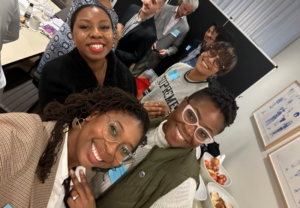
What does it mean to be an American territory? In many ways, this question framed The Right to Democracy Summit (RtD) on U.S. Colonialism held in New York last October. The Summit convened stakeholders from across five U.S. territories– American Samoa, Guam, Northern Mariana Islands, Puerto Rico, the United States Virgin Islands, – and allies for a series of dynamic discussions and workshops. Participants represented a wide range of industries ranging from academia, government, consulting, education, philanthropy, legal fields, media, and community advocacy. The Summit gave participants an opportunity to deepen our understanding of how U.S. colonialism manifests across the globe and the many ways territorial inhabitants occupy a liminal position in the U.S. empire. Through workshops and dialogue, many participants found that we face similar challenges as people of America’s other insular areas. We came to understand, in new ways, how racism, imperialism, militarism, environmental injustice, cultural erasure, and extractive economic models all create a dependence on the U.S. and contribute to underdeveloped infrastructure as well as to island people’s displacement.
Because American colonialism has long relied upon conquest and division, prioritizing community becomes a particularly powerful strategy in decolonization efforts. By convening delegates from all of the five American territories, the Summit reinforced the importance of leveraging community in the process of confronting our colonial relationship to the United States. For most of us, this was the first time that we participated in a forum with representatives from all 5 of the U.S. territories present in order to explicitly challenge American colonialism and encourage critical and generative dialogue. The opportunity to do so, allowed us to feel seen in our anti-colonial struggles, seeded hope and both deepened and expanded networks of solidarity. Coming together to teach and learn about the similarities and differences of our territories allowed us to strategize, engage in visioning sessions, and craft solutions to the colonial conundrum we all face. Participants recommended creating a territorial curriculum, a media network and guidelines, and legal campaigns. These outcomes left many of us with a desire to see consistent and continued engagement with Right to Democracy around self-determination efforts in the future.
During the first day of the Summit, delegations from each territory were asked to illustrate our colonial relationship with the United States of America. The illustrations articulated the structural inequity that shapes the contemporary colonial dynamic and its historical antecedents. As America’s only predominantly Black colony, Virgin Islanders’ noted the territory’s position on the intersection of anti-blackness, the climate crisis, and colonialism. We also highlighted how this intersection often causes us to be overlooked by the United States, particularly during times of disaster. People from the other territories also described the unique aspects of their colonial relationship to the United States. Participants from Guam, for example, articulated the terror and precarity associated with being a strategic location for the U.S. armed forces, having big pieces of land taken for the military, and a DF-26 Chinese missile called “the Guam Killer” aimed at their communities. As each territory presented, we were able to bear witness to one another’s struggles and hold space for our individual and collective hope. Even our discussions about our travel to New York helped us to better understand the sprawling reach of American colonialism and its human impact!
The second day of the Summit featured conversations with philanthropy at the Ford Foundation. Experts in the field spoke specifically about how philanthropy often excludes U.S. territories, which occupy a liminal position between “foreign” and “domestic” in the American political and philanthropic imaginaries. Far too often, U.S. territories are excluded from philanthropic funding and support because of the ways in which our relationship to the United States remains mostly “hidden” from public and political discourses. This creates a reality wherein most American territories receive only an average of cents in funding per capita. Presentations and discussions during the second day also emphasized the need to better integrate American racial equity and civil rights issues with the effects of American colonialism in U.S. territories. Limited conceptions of racial justice have long made it difficult for territorial subjects to be considered as beneficiaries of American philanthropic work.
However, even as we appreciated the community-building generated by the RtD Summit, for some participants, the convening also gave space to explore critical concerns about equity and inclusion in decolonial processes and movements. The RtD Summit came on the heels of a series of Community Dialogue Sessions in each of the aforementioned territories. Yet, there was an awareness of the fact that many of the participants in the Summit were experts in their fields. A member from the Virgin Islands delegation posed the question, “Who is not in the room?” This question sparked a thoughtful discussion about some of the ways in which decolonial work can prioritize hierarchies that center the voices of the most privileged members of a marginalized community, and reproduce colonial models and logics. The question also provided an opportunity for us to reflect on the how of what we were doing as much as the what of what we were hoping to accomplish.
Indeed, confronting our undemocratic and colonial relationship to the United States necessitates a democratic and decolonial approach to the movement. As we consider the power imbalance that exists between U.S. territories and the United States, we must also be aware of how power moves within our political advocacy work. If we are to successfully liberate ourselves from undemocratic colonial governance, we will need a broad-based coalition and a strong decolonial ethos to guide all aspects of the work. We look forward to the continued decolonial efforts that Right to Democracy aims to promote and to participating in a coalition that was created to work on what we all identified as common ground: pushing forward community-based initiatives that will promote a reckoning in the U.S. on the unacceptable existence of American colonies.





